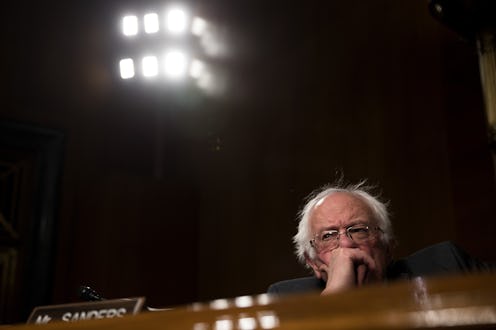News
Sanders Has A Key Question About Trump & Russia

Alright, so at this point, everyone knows that the spider web of alleged connections between the Trump campaign and the Russian Federation is vast and complicated. A certain senator from Vermont, however, has hit on one facet that no one has yet been able to determine. Bernie Sanders' question about Trump and Russia is simple and to the point, and it's exactly what should be on everyone's tongue right about now: What did Donald J. Trump himself know about the meetings and talks between people affiliated with his campaign and people affiliated with Russia?
Way back before this was even a huge thing, there was Paul Manafort, Trump's campaign manager who had a long history of doing business in Russia and Ukraine. Once this and other campaign struggles bubbled to the surface, Manafort "resigned," or, in other words, was pushed out of the Trump campaign. Manafort denies having had contact with Russian officials — and Trump himself did not comment on the situation.
Then you had Carter Page and Roger Stone, who were both more loosely tied to the campaign and who allegedly had some connection with the Russian hacks. They denied any wrongdoing, and Trump made no comment.
Let's not forget the DNC hacking, which the intelligence community agreed was a Russian action. Trump, however, wasn't so quick to place the blame on Russia, saying over and over again that it could have been China or an independent hacker. So, to round up what we have so far — three people aligned with the Trump campaign with connections to Russia, zero comment from the candidate himself, and a major hack that Trump insists can't be coming from Russia. OK. Now, let's move on.
Things got serious, then, when National Security Adviser Michael Flynn lied about the nature of his contacts with Russian ambassador to the United States Sergey Kislyak, an affair that ended his brief tenure in the Trump administration. The New York Times has now reported that Flynn wasn't the only one on contact with Kislyak in December 2016 — Trump's son-in-law, Jared Kushner, was also present for a number of meetings. Trump has made no comment on the recent revelation about Kushner, but he did say that the media treated Flynn "so badly."
Finally, the most recent major bombshell came on Wednesday, when the Washington Post reported that Attorney General Jeff Sessions had talked to Ambassador Kislyak multiple times during the campaign and then not disclosed it during his confirmation hearing. Trump did respond to this, quite forcefully, with the content of his response basically saying that Sessions had not outright lied and that the Democrats were leading "a total witch hunt."
To sum it all up, the Trump-Russia situation as it stands right now involves a lot of accusations and allegations, some proven and some not, and a lot of questions still remaining. One thing that has stayed consistent, though, is the president's denial that his campaign had any connection with Russia — despite all the news that has been appearing about connections between his campaign and Russia.
Given that the intelligence community is in agreement that Russia intervened to sway the election towards Trump, any link between the two is worth investigating. Trump has not made anything better for himself by insisting that all reported connections between the two are Democratic fabrications or media nonsense, especially when the allegations become serious enough for, say, his national security adviser to resign or his attorney general to agree to recuse himself from any investigation into the matter.
Through all this, though, no one has been able to provide a definite answer to Sanders' question about whether the president himself knew about the various meetings that we now know took place between his campaign and Russia. His denials, after all of his other lies, should be taken to mean nothing. The other connections are serious enough — but if it could be uncovered that Trump himself actually knew about them or condoned them, then we're really getting into impeachment territory.
Trump has backed himself into a corner, and he can be sure the reporters are working overtime to figure out the answer to Sanders' question. His best strategy at this point would be to agree to complete openness — but hoping for that would be like waiting for pigs to fly. For now, he can only stand by his denials, and watch as the denials of his inner circle keep failing as more elements of the truth come out.